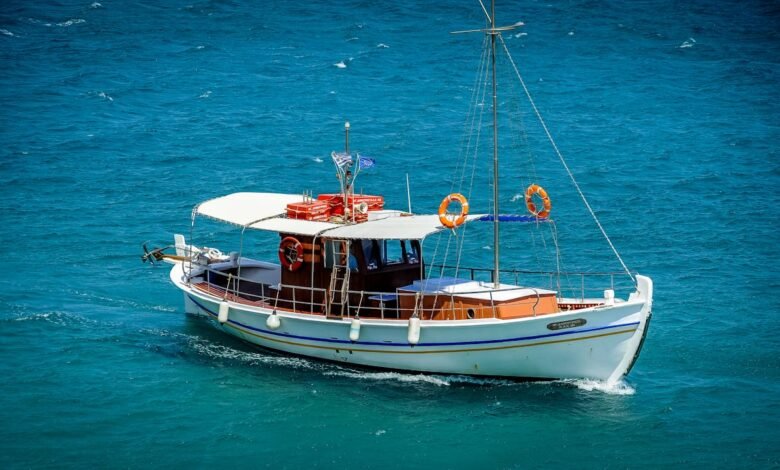How Much Do Marine Biologists Make: Unveiling Ocean’s Wealth

How Much Do Marine Biologists Make? Marine biologists make an average salary of around $63,000 per year. Marine biology is a fascinating field that combines a love for the ocean with scientific research.
If you’ve ever wondered about the salary potential in this profession, you’ll be pleased to know that marine biologists can earn a comfortable income. While the exact salary can vary depending on factors such as experience, education, and location, the average annual salary for marine biologists is approximately $63,000.
This makes it a promising career choice for those interested in marine life and conservation. In this blog post, we will explore the salary range, factors affecting earnings, and the rewarding nature of being a marine biologist. So, let’s dive in and discover the financial aspect of this exciting profession!

Credit: merchantnavyinfo.com
Diving Into Marine Biology
Marine biology is an exciting and rewarding field that allows individuals to explore and study the vast and diverse world of marine life. From deep-sea creatures to coral reefs, marine biologists play a crucial role in understanding and protecting our oceans and the species that inhabit them. But what does a career in marine biology look like, and how much can one expect to earn in this field? Let’s dive into the world of marine biology and explore the role of marine biologists, their key responsibilities, and how much they make.
The Role Of Marine Biologists
Marine biologists are scientists who study marine life and the ocean’s ecosystems. They work in a variety of settings, including research institutions, government agencies, and conservation organizations. Marine biologists use a combination of fieldwork, laboratory analysis, and computer modeling to study marine organisms and their environments.
Key Responsibilities
Marine biologists have a wide range of responsibilities, which may vary depending on their specific area of expertise. Some of the key responsibilities of marine biologists include:
- Conducting research on marine organisms and ecosystems
- Collecting and analyzing samples from the ocean
- Developing and testing new technologies for studying marine life
- Collaborating with other scientists and organizations to promote marine conservation
- Teaching and mentoring students in marine biology
How Much Do Marine Biologists Make?
The salary of a marine biologist can vary depending on their education, experience, and location. According to the Bureau of Labor Statistics, the median annual salary for zoologists and wildlife biologists, which includes marine biologists, was $67,760 in May 2020. The lowest 10% earned less than $43,800 per year, while the highest 10% earned more than $111,610 per year. Marine biologists who work for the federal government tend to earn higher salaries than those who work for state or local governments or in research and development.
:max_bytes(150000):strip_icc()/494359025-57c4739e3df78cc16e9c45ae.jpg)
Credit: www.thoughtco.com
The Ripple Effect Of Education
Marine biologists earn salaries influenced by factors like experience, location, and employer. How Much Do Marine Biologists Make? Typically, entry-level professionals make around $50,000 annually, while seasoned experts can earn upwards of $100,000. Specialized fields like research or consulting may offer higher pay opportunities.
Degrees And Credentials
Obtaining advanced degrees boosts earnings potential significantly.
Specializations Impacting Income
Specialized fields like marine mammalogy can lead to higher pay.
The Ripple Effect of Education:
Education in marine biology creates a pathway to lucrative careers. Advanced degrees and specialized credentials are catalysts for higher income opportunities. Marine biologists with sought-after specializations often command premium salaries.
Navigating The Currents Of Opportunity
Embark on a journey to explore the salary range of marine biologists. Discover the earning potential in this fascinating field. Explore the currents of opportunity for marine biologists in the job market.
Industry Demand
Marine biology is a field that is experiencing a surge in demand. With increasing concern for the health of our oceans and marine ecosystems, the need for skilled marine biologists has never been greater. From studying the impacts of climate change on coral reefs to researching the behavior of marine mammals, the work of marine biologists is crucial in understanding and protecting our marine environments.
One of the factors driving the demand for marine biologists is the growing recognition of the economic value of our oceans. Industries such as fisheries, aquaculture, and tourism heavily rely on the expertise of marine biologists to ensure sustainable practices and the preservation of marine resources. As a result, marine biologists are sought after by both public and private sectors, offering a wide range of career opportunities.
Geographical Influence
The geographical location can significantly impact the opportunities and earning potential for marine biologists. Coastal regions, with their proximity to the ocean, tend to have a higher demand for marine biologists. This is especially true for countries with extensive coastlines, such as the United States, Australia, and Canada. In these coastal regions, marine biologists have access to diverse marine ecosystems, including coral reefs, estuaries, and kelp forests.
This abundance of marine habitats creates a wealth of research and conservation opportunities. It also means that marine biologists in these areas may have more job prospects and higher salaries compared to those working inland. However, it’s important to note that advancements in technology have made it possible for marine biologists to work remotely or collaborate with researchers around the world. This means that even if you are located in a landlocked area, you can still contribute to marine biology research and find opportunities in the field.
Overall, the demand for marine biologists is on the rise, and geographical location can play a role in the opportunities available. Whether you are drawn to the bustling coastal cities or prefer to explore the depths of the ocean from anywhere in the world, the field of marine biology offers a wide range of exciting and rewarding career paths. So, if you have a passion for the ocean and a desire to make a difference, consider navigating the currents of opportunity in the field of marine biology.

Credit: www.youtube.com
Tales Of The Tide: Salary Surveys
Marine biologists’ salary surveys reveal the earnings potential in this fascinating field. Discover how much these professionals make, and explore the tales of the tide in the world of marine biology.
Marine biology is a fascinating field that offers a variety of career paths. However, before pursuing a career in this field, it is important to know how much marine biologists make. In this section, we will explore the salary surveys of marine biologists and what factors affect their earnings.
National Averages
The national average salary for a marine biologist in the United States is $64,000 per year, with salaries ranging from $32,000 to $96,000 per year. Factors that affect salary include education level, years of experience, and location. For example, marine biologists with a Ph.D. tend to earn more than those with a bachelor’s or master’s degree, and those working in metropolitan areas tend to earn higher salaries than those working in rural areas.
International Waters
The salary of a marine biologist working in international waters varies greatly depending on the country and organization they work for. In general, marine biologists working for government agencies tend to earn higher salaries than those working for non-profit organizations. For example, marine biologists working for the Australian government can earn between $65,000 and $130,000 AUD per year, while those working for non-profit organizations in the same country may earn around $40,000 AUD per year.
Overall, the salary of a marine biologist depends on various factors such as education level, years of experience, location, and type of organization. However, it is important to note that marine biology is not a career that one chooses for the salary alone. It is a field that requires passion, dedication, and a love for the ocean and its inhabitants.
Exploring The Depths: Experience Matters
Entry-level Expectations
For entry-level marine biologists, the average annual salary typically falls within the range of $40,000 to $60,000. At this stage, professionals are often engaged in fieldwork, data collection, and research projects under the guidance of more experienced colleagues.
The Climb To Seniority
As marine biologists gain more experience and expertise in their field, their earning potential naturally increases. Mid-career professionals can expect to earn between $60,000 and $80,000 annually, while those at the senior level can command salaries exceeding $100,000. These individuals often lead teams, manage projects, and are sought after for their specialized knowledge and skills.
Surfacing Additional Income Streams
Marine biologists not only have the opportunity to pursue their passion for the ocean and its inhabitants but can also explore various additional income streams. These alternative avenues allow them to diversify their earnings and contribute to their financial stability. In this article, we will explore two potential sources of additional income for marine biologists: consultancy roles and educational outreach.
Consultancy Roles
One way marine biologists can supplement their income is by taking on consultancy roles. These roles involve providing expert advice and guidance to organizations or individuals in need of marine-related expertise. Companies involved in coastal development, environmental conservation, or even government agencies often seek the insights and knowledge of marine biologists.
Consultancy roles offer marine biologists the opportunity to apply their expertise in a practical and impactful manner. By assessing the potential environmental impact of projects, conducting research, or advising on sustainable practices, marine biologists can make a significant difference while earning an additional income.
Educational Outreach
Another avenue for marine biologists to generate additional income is through educational outreach. This involves sharing their knowledge and passion for marine life with the public, schools, or organizations through workshops, presentations, or guided tours.
By engaging with diverse audiences, marine biologists can not only educate and inspire others about the importance of marine conservation but also generate income through speaking engagements, workshops, or even organizing eco-tours. These opportunities allow them to showcase their expertise while making a positive impact on people’s understanding of the marine world.
Engaging in educational outreach not only benefits the marine biologist financially but also contributes to raising awareness and fostering a sense of stewardship for the marine environment in the broader community.
By exploring consultancy roles and educational outreach, marine biologists can create additional income streams that align with their expertise and passion. These opportunities not only offer financial stability but also allow them to make a lasting impact on marine conservation and education.
Buoyant Benefits Beyond Paychecks
Exploring the world beneath the waves as a marine biologist offers enticing advantages that extend beyond monetary rewards.
Health And Retirement Perks
Marine biologists often enjoy comprehensive health insurance coverage and generous retirement plans as part of their employment benefits.
Travel And Research Grants
Marine biologists may receive funding for travel to exotic locations for research purposes, enabling them to broaden their knowledge and contribute to marine conservation efforts.
Conservation And Financial Sustainability
Marine biologists can earn a competitive salary, with the average annual pay ranging from $50,000 to $80,000. However, salaries can vary based on factors such as experience, education, and the specific field of marine biology. Achieving financial sustainability in this profession is possible through conservation efforts and seeking opportunities in research, education, and consulting.
Funding For Marine Conservation
Marine conservation relies on various sources of funding. Donations, grants, and partnerships support initiatives.
The Economic Impact Of Marine Research
Marine research contributes to economic growth. It aids in sustainable resource management. Marine biologists play a critical role in conservation. Financial sustainability ensures long-term impact. Marine research funding drives innovation and progress. Conservation efforts benefit from financial support. Marine biologists’ work impacts ecosystems worldwide. Sustainable funding is crucial for long-term success.
Frequently Asked Questions
What Is The Average Salary For Marine Biologists?
Marine biologists can expect to earn an average salary of around $63,000 per year. However, this can vary based on factors such as experience, education, and the specific industry or location in which they work.
What Factors Can Affect A Marine Biologist’s Salary?
Factors such as experience, education level, geographic location, and the specific industry in which a marine biologist works can all influence their salary. For example, those working in research and development may earn more than those in government positions.
Are There Opportunities For Advancement In Marine Biology Careers?
Yes, marine biologists have opportunities for advancement, such as taking on higher-level research roles, pursuing advanced degrees, or moving into management positions. Continuing education and gaining experience in the field can lead to increased opportunities for career growth and higher salaries.
What Are Some Of The Highest-paying Industries For Marine Biologists?
Industries such as pharmaceutical and medicine manufacturing, scientific research and development services, and federal government agencies tend to offer some of the highest salaries for marine biologists. These sectors often require specialized knowledge and skills, which can command higher compensation.
Conclusion
Marine biologists can earn competitive salaries, with factors such as experience and location influencing their pay. The field offers diverse opportunities for career growth and allows individuals to make a meaningful impact on marine life. As the demand for marine conservation increases, the earning potential for marine biologists is likely to grow as well.





